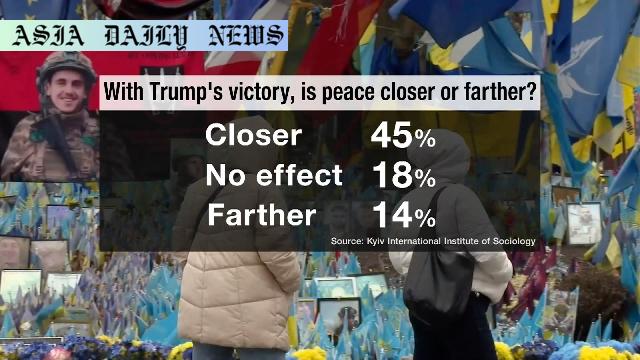Trump: Almost half of Ukrainians believe Trump’s presidency could bring peace closer, signaling cautious optimism amid the ongoing Russia-Ukraine conflict.
- Trump is seen by 45% of Ukrainians as bringing peace closer in the ongoing conflict with Russia.
- 18% believe his presidency doesn’t affect the situation, while 14% see peace becoming more distant.
- 29% indicate peace negotiations will involve both Ukraine’s demands and Russian concessions.
- Survey reveals cautious optimism and restrained perspectives towards Trump’s impact on the region.

Overview of Survey Results and Key Findings
A recent survey conducted by the Kyiv International Institute of Sociology highlights the varying perceptions of Ukrainians regarding the impact of US President Donald Trump’s victory on the ongoing conflict between Ukraine and Russia. The poll, carried out between December 2 and December 17, involved 985 respondents. It revealed that 45% of participants believe Trump’s leadership could bring peace in Ukraine closer. This sentiment is juxtaposed with the 18% who view his presidency as inconsequential to the conflict, and 14% who feel peace is now more distant.
Expectations for Peace: Fairness and Compromise
The survey further delves into Ukrainians’ expectations of the nature of any potential peace agreement. According to the findings, 31% of respondents expressed skepticism, anticipating that any resolution might be mostly or completely unfair to Ukraine. Meanwhile, 23% held a more hopeful view, suggesting that peace may be mostly or completely fair. Notably, 29% of those surveyed believe that a peace deal would involve both Ukraine making concessions and Russia addressing some of Ukraine’s demands, although it remains uncertain which side’s compromises would be greater.
Cautious Optimism Amid Uncertainty
The survey underscores a sense of cautious optimism among Ukrainians regarding Trump’s potential role in resolving the conflict. The analysis provided by the Kyiv International Institute of Sociology suggests that Trump’s victory does not elicit extreme reactions, whether in terms of euphoria or despair. Instead, expectations are characterized by a mix of restrained hope and pragmatism, as many Ukrainians appear receptive to the possibility of a “fresh” approach to the Russia-Ukraine war under his administration.
The Broader Context of Trump’s Foreign Policy
Trump’s unexpected foreign policy strategies have been a subject of global discussion. In the context of Ukraine, his call for an early end to the Russian invasion has sparked debates about his ability to exert influence over international geopolitics. While his presidency has often been associated with unpredictability, many see his direct approach as a potential disruptor to the status quo, raising hopes for diplomatic progress in a long-standing conflict.
The Role of U.S. Leadership in Global Peace Efforts
The United States has historically played a pivotal role in resolving international conflicts through diplomacy and strategic intervention. Against this backdrop, Trump’s stance on the Russia-Ukraine war is of significant interest not only to Ukrainians but also to the global community. While skepticism lingers due to his polarizing political style, his presidency introduces new variables into an otherwise enduring conflict dynamic. Whether this translates into meaningful change remains to be seen.
Conclusion: A Hopeful Yet Wary Outlook
In conclusion, the survey results reflect a measured optimism among Ukrainians regarding Trump’s potential to influence peace negotiations. These perspectives underline the broader sense of hope and hesitation surrounding his presidency, particularly in regions affected by geopolitical strife. While the path to peace is fraught with complexities and uncertainties, the notion that US leadership under Trump could bring “freshness” to the negotiation table resonates with a significant portion of Ukraine’s populace. Ultimately, whether this optimism materializes into tangible outcomes will depend on the decisions made by all parties involved in resolving the conflict.



Commentary
The Significance of Ukrainian Perceptions
The Ukrainian survey results provide a fascinating lens into the mindset of a nation embroiled in conflict. The belief that Trump’s presidency could bring peace closer reflects a broader sentiment of hoping for change amidst prolonged uncertainty. These perspectives underline the importance of international leaders in shaping and influencing regional peace efforts. While it is encouraging to see restrained optimism, it is also a reminder of the pervasive impact of global politics on local realities.
Weighing Optimism Against Realism
While optimism is always welcome in contentious scenarios, it is crucial to balance hopeful thinking with realistic expectations. Trump’s foreign policies have often been unconventional, and this unpredictability might either expedite conflict resolution or complicate diplomatic efforts further. The poll results indicating skepticism and concerns about fairness in any resulting peace deal underline the complexities involved. Peace in Ukraine will require substantial compromise, and it is unlikely to please all stakeholders equally.
The Role of Public Opinion in Peace Processes
Public sentiment often serves as a barometer for potential actions by political leaders. The survey’s findings suggest that Ukrainians are both realistic and cautiously hopeful, a balance that could potentially influence how Ukraine approaches peace negotiations. Citizens’ perspectives will play a critical role in holding leaders accountable for decisions on critical national issues. It is vital to keep these opinions in mind as global powers, including the United States, attempt to mediate the conflict.
The Road Ahead
Ultimately, this survey sheds light on the intricate interplay between global leadership and localized conflict resolution. While the optimism surrounding Trump’s presidency is noteworthy, achieving long-term peace in Ukraine will likely require multifaceted efforts involving numerous stakeholders. Still, the prospect of introducing a “fresh” perspective to the negotiation table, as indicated by the survey’s analysis, could be an invaluable step toward resolving one of Europe’s most significant modern conflicts.